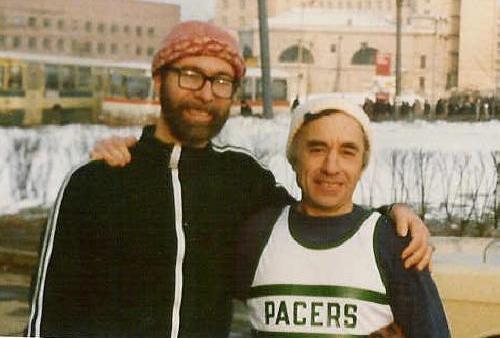Stories
The brain mechanisms of aggression
Motivational systems of social behavior
International Society for Research on Aggression
Behavior Genetics Association Ethics Committee
The World Wide
Runners Club
for Peace
United Nations University for Peace
Charlie Robbins, barefoot runner
* * *
There is a comradery in sports that brings people together across political and ideological boundaries, and has a great potential for peace. This can explain the remarkable friendship that I struck up with David Fastovsky beginning in 1976, which led to the Worldwide Runners Club for Peace.
David and I met at the old outdoor swimming pool in Moscow, which was later destroyed to make room for Zurab Tsereteli's recreation of the Orthodox Cathedral in Moscow. Discovering our common love of long distance running, we used to go out together on long runs, always circling at some point around Moscow State University, a task that he called "moi dolg" which roughly translates as a kind of symbolic obligation, the kind of behavior common in runners. At that time, while running had become very popular in the States, it was only begnning to catch on in the Soviet Union.

With David Fastovsky at the Runners Club in Gorky Park. He is wearing a shirt I have given him from my running club in the States.
In 1981, on my way back from teaching in Soviet Georgia, I stopped in Moscow for a run with David in the cold December winter and found that he had helped to organize a running club that had grown to 2500 members with a makeshift clubhouse in Gorky Park. He had accomplished this by printing up a personal card and handing them out to the runners he passed over the years.
We agreed that the time was ripe for an exchange of ordinary runners between our two countries to break through the deadlock of official diplomacy and the threat of nuclear war and to establish people-to-people contacts.
Back in the States, I was fortunate enough to meet Gerry Wright, founder of DARE, the largest social service agency in the innter city of Boston, who shared our dream and who went to Moscow to run in the 1982 Moscow marathon. There, he met David Fastovsky and Kiril Bronnokov, Vice Present of the Moscow Club, and the enthusiasm mounted.
Gerry and David enlisted the greatest runners to back the project: in the Soviet Union, the Olympian Valerie Borzov and in the United States, the marathoners Bill Rodgers and Joan Benoit.
Although the United States pulled out of the Olympics in Moscow, where the WWRCP had hoped to promote peace among runners, Gerry Wright was able to establish a Boston Peace Marathon which drew Soviet Runners and did what the Olympics could not. Our plan had been to run an open People's Marathon at the Moscow Olympics with multiple starts all the same distance from convergence points, which would allow tens of thousands of runners to participate. Of course those qualified for the olympic games would have had a starting point that was exclusively theirs and by the time other runners arrived at the convergence point a few miles into the course, the elite runners would have already gone by.
As my energies were directed into the related projects of the Peoples Peace Appeal and the American-Soviet Friendship Societies, I gradually lost touch with the WWRCP.
 |
Stages
1986-1992
Fall of Soviet Empire
1992-1997
UNESCO Culture of Peace Programme